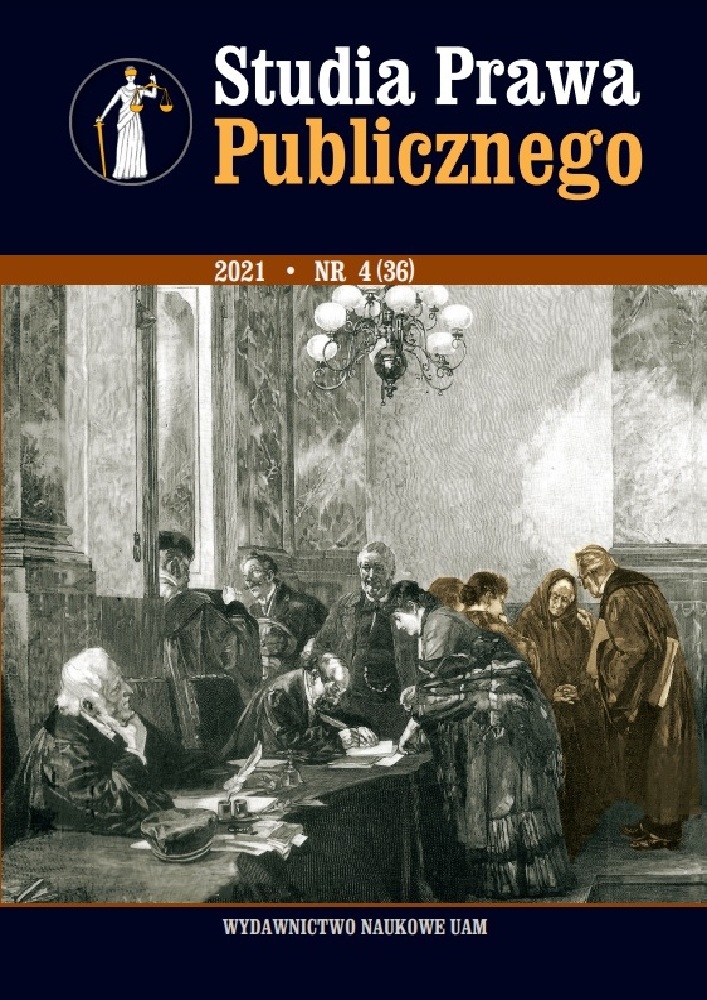Abstract
The article concerns the competences of the organs of the Sejm and the Senate related to protecting the dignity of the chambers. These competences were established as a part of a reaction to the course of the so-called “Sejm crisis”, consisting in the occupation, initially, of the Sejm’s rostrum and then the Sejm’s Meeting Room by MPs from opposition parties at the turn of 2016 and 2017. Using the dogmatic method, the publication aims to define the essence of competences, their applicable and planned regulations, and to evaluate these regulations and formulate possible de lege ferenda postulates on the basis of this evaluation. The main thesis of the article includes a negative evaluation of the applicable regulations of competences due to their contradiction with certain provisions of the Constitution, in particular with Art. 2 of the Constitution, i.e. within the framework of the principle of a democratic state ruled by law established in this provision and the resulting, inter alia, principles of decent legislation, including the principle of the specificity of law, as well as Art. 54 sec. 1 in connection with Art. 31 sec. 3 of the Constitution (i.e. the freedom of expression), Art. 11 of the Constitution (i.e. the freedom to establish and freedom of activity of political parties within the scope of the purpose of their activity, which is to influence on state policy by democratic methods) and Art. 32 of the Constitution (i.e. the principle of equality of political parties resulting from the principle of political pluralism). In this context, the most important is the risk of the so-called “chilling effect”. The publication also includes a positive evaluation of a few of the planned regulations of competences, which may allow for the elimination of the above contradictions or ensure a more complete implementation of the objective of competences, including guaranteeing the dignity of the chambers.
References
Uniwersalny słownik języka polskiego, pod red. S. Dubisza, t. 2, t. 3, Warszawa 2003.
Grajewski K., Odpowiedzialność posłów i senatorów na tle zasady mandatu wolnego, Warszawa 2009.
Gromski W., Kompetencja, w: Słownik wiedzy o Sejmie, pod. red. A. Preisnera, Warszawa 2001.
Koksanowicz G., Prawny model kierownictwa Sejmem w świetle Konstytucji Rzeczypospolitej Polskiej z 2 kwietnia 1997 roku, Lublin 2014.
Odrowąż-Sypniewski W., Komentarz do art. 23 Regulaminu Sejmu Rzeczypospolitej Polskiej, w: Komentarz do Regulaminu Sejmu Rzeczypospolitej Polskiej, pod red. A. Szmyta, Warszawa 2018.
Szmyt A., Opinia prawna w sprawie kompetencji Marszałka Sejmu i Prezydium Sejmu oraz obowiązków Kancelarii Sejmu w sprawach z zakresu ochrony godności i powagi Sejmu, jego organów i posłów, Warszawa, dnia 9 czerwca 2015 r., Kancelaria Sejmu.
The Chilling Effect in Constitutional Law, „Columbia Law Review” 1969, vol. 69, no. 5, https://www.jstor.org/stable/1121147?origin=crossref (dostęp: 25 X 2021).
Zubik M., Organizacja wewnętrzna Sejmu Rzeczypospolitej Polskiej, Warszawa 2003.
License
Copyright (c) 2021 Paweł Malec-Lewandowski

This work is licensed under a Creative Commons Attribution-NonCommercial-NoDerivatives 4.0 International License.

